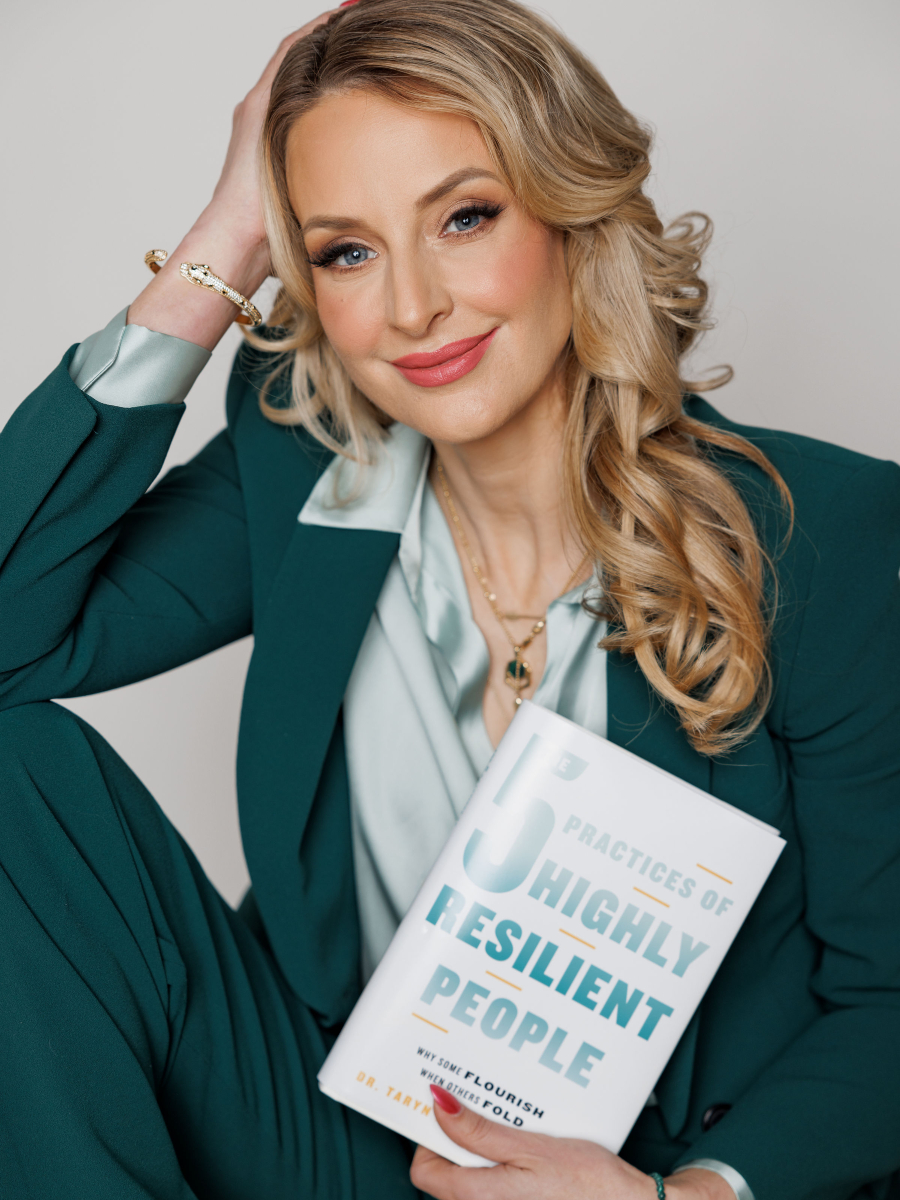This Philly Author Says Everything We Think We Know About Resilience Is Wrong
We chatted with Taryn Marie Stejskal about her book The 5 Practices of Highly Resilient People, which comes out today.

Conshohocken-based author Taryn Marie Stejskal talks her new book, The 5 Practices of Highly Resilient People. / Book jacket courtesy of Hachette Go; headshot by Kseniya Berson Photography.
For the past three years, the word “resilience” has cropped up countless times in conversations, books, TV ads and on social media. It’s been used so much that Arianna Huffington deemed it the word of 2020 — followed by ‘resilience+’ in 2021 (which she said could be the word of the decade).
And yet, people are sick of resilience. Folks have argued that being — and being told to be — resilient has become a form of tone-deaf optimism (a cousin of toxic positivity!); code for “You’re on your own” especially in the wake of trauma and grief; and a misused, watered-down version of itself.
It’s one of the reasons Taryn Marie Stejskal, founder of the Resilience Leadership Institute, wants to reclaim the word — so much so that the Conshohocken-based resilience expert and podcast host wrote an entire book about it.
Stejskal’s The 5 Practices of Highly Resilient People: Why Some Flourish When Others Fold officially publishes today. Ahead of the book’s debut, we chatted with Stejskal about how she understands resilience, why it has become so misunderstood (and hated!) by society, and the practices people can take whenever they’re faced with challenge, change and complexity.
Be Well Philly: How do you define resilience?
Stejskal: I have a very different perspective of resilience than other people — that resilience is the essence of being human. That means we don’t have to go out and find resilience from some external source. Resilience is already part of us; it lives within us. How do I know this? Well, we’ve all already survived every loss, disappointment, turn of events, crisis, and rejection so far. And most of us have turned out better, or at least we’ve come away with a new perspective that we otherwise wouldn’t have chosen.
That’s why I’ve defined resilience as “the ability to effectively address the challenge, change, and complexity (the three Cs) in a manner that allows us to be enhanced by the experience, not diminished.” It’s the skill set that allows us to face the three Cs and collectively uplift one another.
Why do you think this definition is more appropriate than society’s current understanding?
In my definition, you don’t see the phrases “quickly recover” or “bounce back.” So often, people think that resilience involves speed to recovery in order to get right back to work or right back to life. People need to give themselves the time they need and deserve to integrate that challenge into what their life looks like now. In fact, being resilient is not about bouncing back at all — it’s about bouncing forward. You’ll never go back to the way you were before what you experienced — that’s science. Every experience we have actually changes us down to the neural/cellular level. Why would we ever think we’d go back to a prior state?
This is making me think of the growing collective hatred for the word …
There’s a lot of people who are sick of resilience and are tired of being told to be resilient. I recently heard someone say, “I can’t wait until I never have to be resilient again.” I think current society has made resilience out to be the problem instead of the solution or the cure. The problem is that we as humans are facing tremendous challenge, change, and complexity lately. We’re exhausted, the world hasn’t gone back to the way it was pre-pandemic, and life has changed in ways we didn’t anticipate. But none of that is resilience’s fault!
Also, I think we’ve done resilience a disservice. Without a clear understanding and accurate use of it, people expect to be told to soldier on, muscle through, or not feel their feelings. And if they can’t, they wonder if they are resilient enough or at all — what I call the “resilience dread spiral” — meaning resilience has essentially been weaponized. But resilience isn’t about putting our heads down and going into robot mode. Instead, it involves experiencing the full complement of our emotions because our feelings can provide information and help heal.

Photograph by Kseniya Berson Photography
With that said, what inspired you to write a book about resilience?
Three or four years ago, I would’ve said that my work on resilience was driven by my graduate degree, pre- and post-doc fellowships in neuropsychology, and working with people living with brain and spinal cord injuries and with women living in rural Maryland who were experiencing financial instability. But truly, resilience found me when I was 14 years old. I was in my childhood bedroom getting dressed for school when I saw a face at the bottom of my window and then heard a voice say, “Take off your clothes. You’re beautiful.”
My book goes in-depth about my [recurring] stalker and my resulting PTSD, but I’ve come to realize that my pursuit of resilience was impacted by that childhood experience. I wanted to take my personal experience and not only understand how people effectively face challenges, but create something that others could benefit from when they inevitably face the three Cs. To me, it’s powerful to take your pain, disorientation, or feelings of loneliness and transmute it into something that’s productive and supportive for yourself and others.
Your book outlines five practices of highly resilient people: vulnerability, productive perseverance, connection, grati-osity (gratitude and generosity), and possibility. How did you come up with them?
I took about two decades of qualitative inquiry to understand the behaviors of being resilient so that people could tap into their innate resilience more effectively. I wanted there to be a blueprint for when people ask, “What am I supposed to do?” when faced with the three Cs. My research involved hundreds of interviews and an abundance of data collection from memoirs, podcasts, journals, documentaries, etc., and I noticed the five practices emerge from all of that.
Of the five, which practice do you believe is the most challenging?
I want any person who reads the book to take the five practices and make them their own. I’ve created the framework, yes, but it’s up to every person how they want to employ it.
For me, the most challenging one has been vulnerability. I was put in a vulnerable position growing up, which led to my PTSD. For a long time, I thought the cure was making myself invulnerable because I was afraid that people wouldn’t like me or they’d leave me. But I found the opposite to be true: Demonstrating vulnerability — having my inside self match my outside self, or the person I am to the rest of the world — was a hallmark of creating a more positive and productive outcome.
I recently stumbled upon an Instagram post that read, “Resilience should not be a life sentence.” I DM’d the original poster and asked what that statement meant, and they replied, “It means resilience is not the end goal. We should create a world where children don’t have to be resilient. We should fix systems that tell people they have to be resilient.” It made me think about the responsibility systems of power have when it comes to mitigating situations that essentially force people to harness their resilience.
First, I think this goes back to our conversation about the term being misunderstood and misused. People don’t relate to a lot of the work that’s being done or has been done on resilience because it whitewashes the pain, struggle, and messiness of life. When we don’t give resilience — and our fellow humans — the respect of the gritty, awful, tough reality, it sends the message that people aren’t allowed to fall apart.
Like resilience itself, the three Cs — challenge, change, and complexity — are part of the fabric of being human. Even though the three Cs are inevitable, society has a role in creating an experience that doesn’t necessarily require people to constantly demonstrate resilience. What that post seems to be saying is we shouldn’t have to go through hard things, but my perspective is that we shouldn’t needlessly have to go through hard things. Do we need to fix some really broken things in the world, like gun violence in schools and communities? Absolutely yes.
This interview has been edited for length and clarity.


